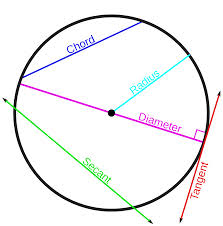tangent
英 [ˈtæn.dʒənt]
美 [ˈtæn.dʒənt]
- adj. 切线的,相切的;接触的;离题的
- n. [数] 切线,[数] 正切
- n. (Tangent)人名;(瑞典)坦根特
星级词汇:

中文词源
tangent 正切,切线
来自拉丁语 tangere,接触,触摸,来自 PIE*tag,接触,触摸,安排,词源同 integer,contact.后 用于数学术语指正切,切线。
英语词源
- tangent (adj.)
- 1590s, "meeting at a point without intersecting," from Latin tangentem (nominative tangens), present participle of tangere "to touch," from PIE root *tag- "to touch, to handle; border on; taste, partake of; strike, hit;" figuratively "affect, impress; trick, cheat; mention, speak of" (cognates: Latin tactus "touch;" Greek tassein "to arrange," tetagon "having seized;" Old English þaccian "stroke, strike gently"). First used by Danish mathematician Thomas Fincke in "Geomietria Rotundi" (1583). Extended sense of "slightly connected with a subject" is first recorded 1825. Related: Tangence; tangency.
- tangent (n.)
- 1590s as a geometric function, from tangent (adj.). From 1650s as "a tangent line." Figurative use of off on a tangent is from 1771.
权威例句
- 1. The conversation went off at a tangent.
- 交谈突然偏离了正题。
- 2. The graph of a concave function is always below its tangent.
- 一个凹函数的图象总在它的切线的下方.
- 3. The tangent may be used to find the direction.
- 这方向也可用正切求得.
- 4. For? 0 we naturally get a circle; for? 0 we obtain two tangent circles.
- 对? 0我们当然得到一个圆; 对? 0得到两个相切的圆.
- 5. It's not easy to follow her thought because she's always going off at a tangent.
- 要跟上她的思路并非易事,因为她老是突然扯到题外去.
